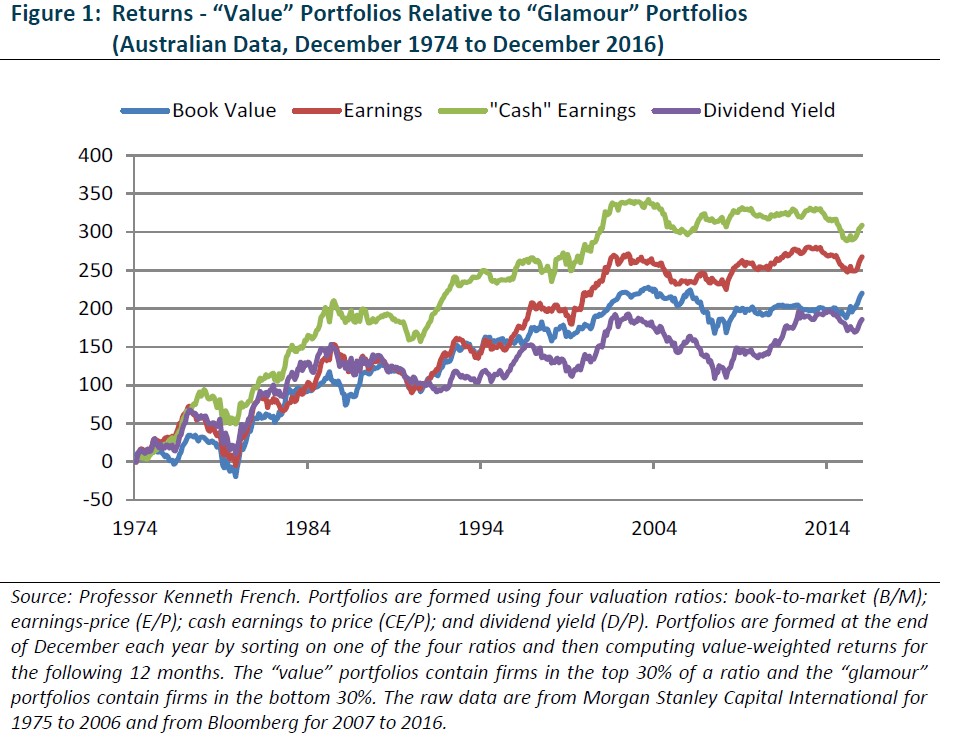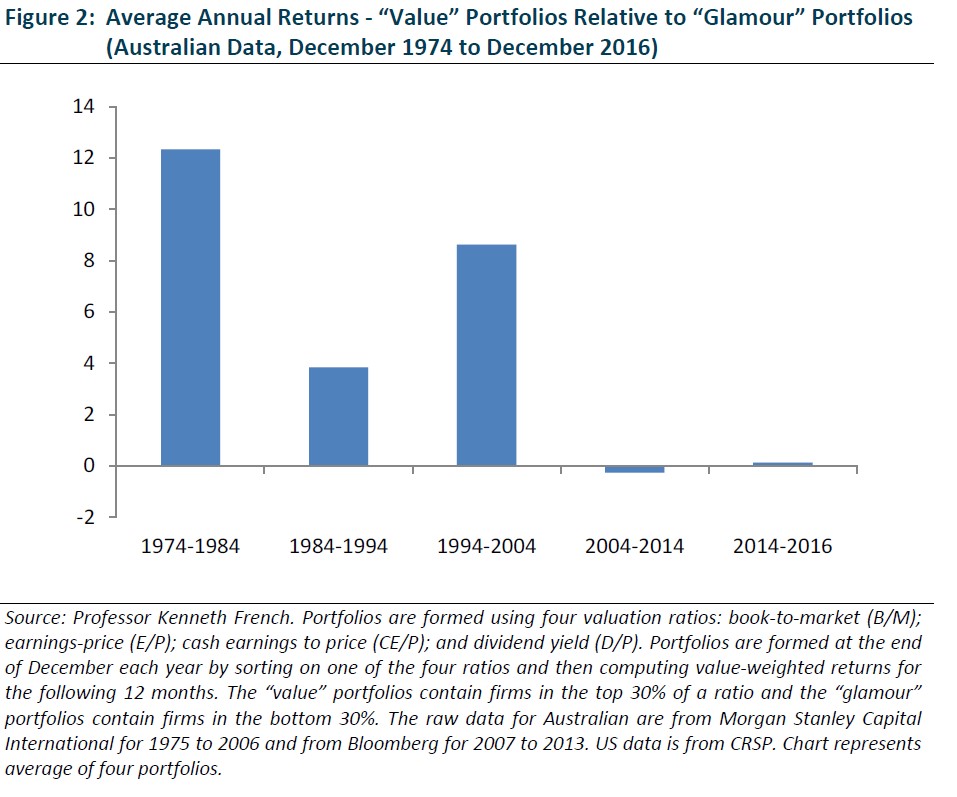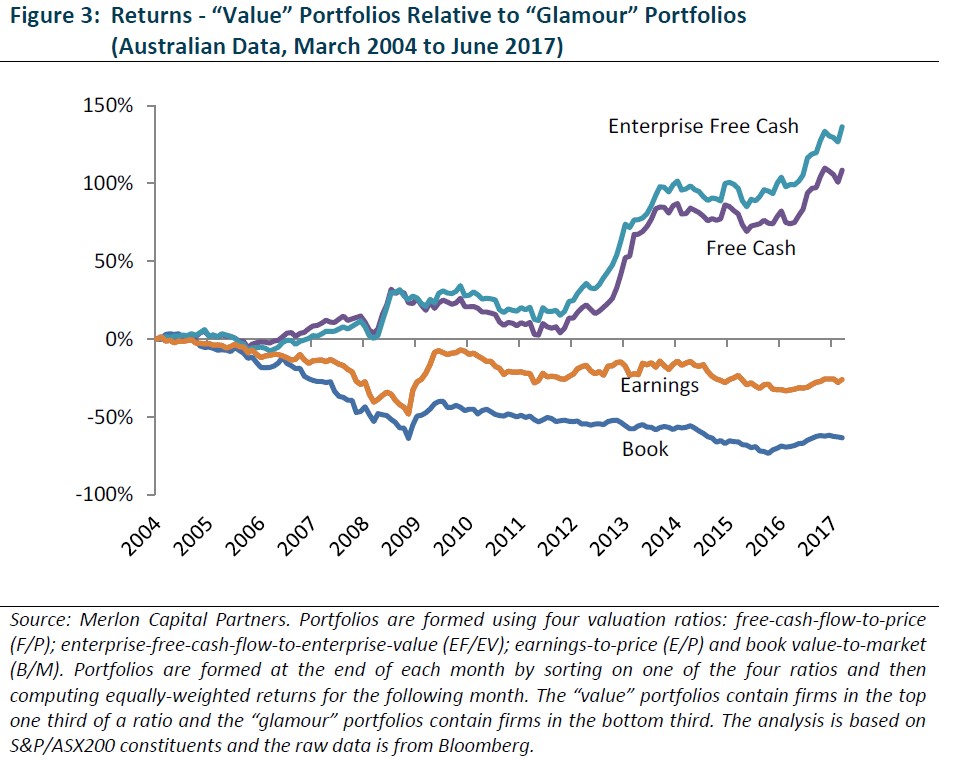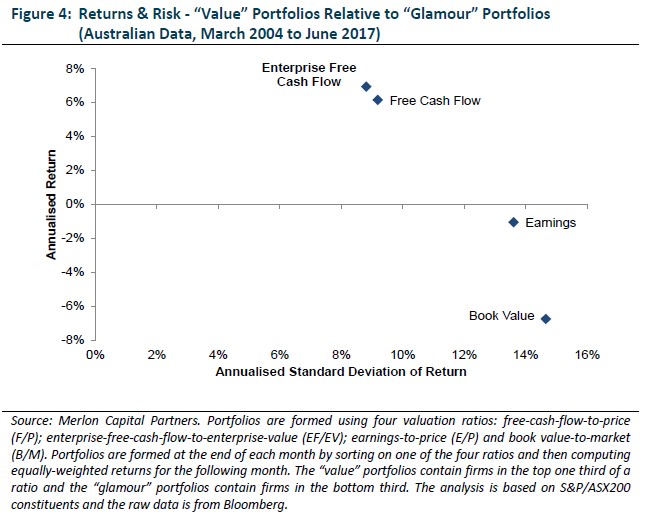Value Investing – An Australian Perspective Part I
Hamish Carlisle, June 2017
While the long term returns from “value investing” are strong and well documented, the approach has struggled over the past decade prompting many investors to question its merits.
This paper represents the first of a two part series discussing value investing from an Australian perspective. The paper examines alternative classifications of “value” and concludes that value investing on the basis of free-cash-flow has performed well through a number of market cycles and has displayed low levels of volatility when compared to traditional classification of value such as earnings, book value and dividends.
These conclusions support Merlon’s investment philosophy which is built around the notion that companies undervalued on the basis of free-cash-flow and franking will outperform over time.
Value Investing – A Long Term Australian Perspective
The performance of “value stocks” is well documented. The chart below highlights the phenomena within an Australian context using more than four decades of data provided by Professor Kenneth French.

Over the 42 year time period for which data is available value portfolios have outperformed glamour portfolios by between 5 and 9 percentage points per annum depending on the way “value” is defined.
Value Investing in Australia – 15 Years of Poor Performance
One interesting point to note in the data presented above is that returns to value investors in more recent periods has been leess than stellar, prompting some commentators to question to the merits of the approach.

Value Investing in Australia – A Crowded Trade
Anecdotally there has been more institutional asset allocation towards value strategies. Many value strategies within Australia have explicitly focused around the traditional classifications used in mainstream academic literature. Perhaps of equal significance is that many commonly deployed “risk models” have measured the extent of a portfolio’s value exposure with reference to these mainstream classifications.
It is possible therefore that institutional asset allocation towards simple strategies focused on the four classifications presented above has acted to reduce the excess returns available from pursuing such strategies. The growing prevalence of so called “smart beta” strategies usually focused around fairly simple and observable value classifications will only serve to accentuate this situation.
Cash is King
Now more than ever, traditional classifications of value based on accounting earnings and dividends are readily manipulated by management. The recent ramp up in dividend payout ratios and the growing divergence between statutory and “underlying” earnings are examples of this. Of course, this situation is not sustainable but can lead investors to mistakenly classify stocks as “cheap” at particular points in time leading to poor investment outcomes.
A sensible approach to dealing with this issue is to classify stocks based on their capacity to generate cash flow over and above that needed to sustain and grow their businesses (“free-cash-flow”). The use of free-cash-flow rather than accounting earnings or dividends is important because the measure is less readily manipulated by management and less readily observable by investors.

The performance of a value strategy that classifies stocks based on free-cash-flow is summarised in the chart above and has performed well compared to traditional accounting based alternatives.
Not only have value portfolios classified on the basis of free-cash-flow outperformed portfolios based on traditional accounting based measures but they have also delivered returns with significantly lower risk profile.

The performance of value investing on the basis of free-cash-flow in an Australian context has been compelling and, in our view, represents a strong foundation for active stock selection. This key finding supports Merlon’s investment philosophy which is built around the notion that companies undervalued on the basis of free-cash-flow and franking will outperform over time.
Why do cash flow based value strategies outperform?
A second key tenant of Merlon’s investment philosophy is that markets are mostly inefficient. We don’t believe that value stocks outperform simply because they are “cheap” but rather because there are misperceptions in the market about their risk profiles and their growth outlooks.
We are focused on identifying and understanding potential misperceptions in the market. To be a good investment, market concerns need to be priced in or deemed invalid. We incorporate these aspects with a “conviction score” that feeds into our portfolio construction framework.
In a second paper to be released next quarter, we will explore the question of why value strategies based on free-cash-flow outperform the broader market. Consistent with our philosophy, we will present findings that dismiss the notion that value investing is “riskier” than passive alternatives and support the presence of persistent behavioural biases in investor expectations.

